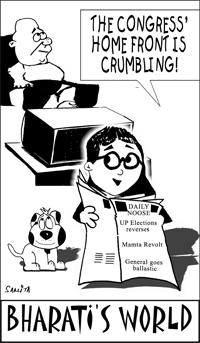A huge row has broken out in the southern state of Karnataka (pop. 61 million) on the issue of the state’s ruling BJP government printing hindutva-inspired textbooks for primary school children enroled in 46,000 government and 3,500 aided primary schools statewide. In February, hundreds of students marching under the banner of 14 organisations including the Students’ Federation of India, National Students’ Union of India and Democratic Youth Federation of India, gheraoed the Department of State Educational Research and Training (DSERT) office in Bangalore to protest ‘saffronisation’ of textbooks.
Addressing a press conference in Bangalore on March 2, former Congress state education minister B.K. Chandrashekar joined the fray and demanded reconstitution of the state government-run Karnataka Textbooks Society (KTS), which selects authors to write textbooks for government and aided schools affiliated with the Karnataka Secondary Education Examination Board. According to him, Prof. G.S. Mudambadithaya, convenor of KTS, is a card-carrying member of the Hindu right wing Rashtriya Swayamsevak Sangh (RSS) with a mission to propagate hindutva ideology. Chandrashekar alleged that together with state primary and secondary education minister Vishweshwar Hegde Kageri, Mudambadithaya has “tinted the books with biases and prejudices”. “Kageri claims the textbooks follow the National Curriculum Framework (NCF) 2005 guidelines, issued by the Congress-led UPA-I government. But actually these books have been modelled on NCF 2000, developed by the BJP-led NDA government (1999-2004) which propagated hindutva. I will write to the chief minister requesting him to scrap these textbooks immediately,” he says.
 Congress spokespersons point out that the texts glorify the Akhand Bharat propaganda of the RSS whose pipe dream is to include Pakistan, Afghanistan, Tibet, Nepal, Bangladesh, Myanmar, Bhutan and Sri Lanka inside a greater India. According to Mudambadithaya, following the furore, the Akhand Bharat map has been dropped from the class VIII social science textbook while being retained under the chapter ‘Ancient India’ in class V social science text.
Congress spokespersons point out that the texts glorify the Akhand Bharat propaganda of the RSS whose pipe dream is to include Pakistan, Afghanistan, Tibet, Nepal, Bangladesh, Myanmar, Bhutan and Sri Lanka inside a greater India. According to Mudambadithaya, following the furore, the Akhand Bharat map has been dropped from the class VIII social science textbook while being retained under the chapter ‘Ancient India’ in class V social science text.
Other criticisms of the texts include the conspicuous absence of any positive references to Dravidians and the Dalits, even as Brahmins and Kshatriyas are glorified. Moreover Hyder Ali, the celebrated anti-British ruler of the Mysore kingdom (1722-1782) is described as an “enemy”. Also there is exaggerated emphasis on Vedic temples and Hindu shrines and rituals to the exclusion of even cursory references to other religions. “Although KTS professes to have revised the first draft of both texts, I know an entire chapter on the Vedic Age has been authored by Jagadguru Shankaracharya Sri Sri Bharati Tirtha Mahaswamiji (of the Sringeri Math) and included without any changes,” says C.S. Dwarakanath, former chairman, Karnataka Permanent Backward Classes Commission.
However, Mudambadithaya contends that all textbooks for government and aided schools are written by academics and scholars selected jointly by KTS and director of DSERT, H.S. Ramarao. According to him, all final drafts of the textbooks are sent to the education minister, the commissioner of public instruction and state editorial board for approval, following which they are sent to District Institutes of Educational and Training (DIETs) and Colleges of Teacher Education (CTEs) statewide for feedback and comment. “Our textbook writing and printing process is elaborate, involving all major stakeholders of the school education system, whose suggestions and feedback we try and incorporate before going to press. Those creating a big fuss over this, hate India and are not qualified to comment as they have not seen the final draft, which has been greatly altered. I am not a BJP man, I’m an educationist. My objective is to educate, not indoctrinate,” says Mudambadithaya, who has worked in the state government’s education department for over 55 years.
However, what Mudambadithaya won’t admit is that he as also the directors of DSERT, DIETs and CTEs, are all government appointees selected by the state government — in this case the BJP government. And it’s an open secret that their appointments are decided by proximity to politicians, ideology and other commercial considerations rather than by merit and track record. Moreover, ‘educationists’ selected by the state’s textbooks society to pen the texts are all government school/college/university teachers. Reputed academics and experts from the private sector are rarely invited on textbook committees. In this flawed and tightly government-controlled Rs.120 crore textbooks printing business, quality, factual accuracy and excellence are secondary considerations.
According to Prof. Jandhyala B.G. Tilak, head of department of educational finance at the National University of Educational Planning and Administration (NUEPA), Delhi, the textbook writing and printing process needs to be overhauled, de-politicised and professionalised. “School textbooks are often tampered with by political parties of the right, left and Centre to propagate their ideologies and prejudices. This has a negative impact on the education system. Textbook content must be left to subject experts and academics who must be given full freedom to develop content under broad guidelines in keeping with the values of tolerance and respect for other religions,” he says.
Meanwhile, with KTS and the state government refusing to share with the public the final ‘altered’ social science texts which are expected to be printed and circulated among government primary schools only at the beginning of the new academic year in June, the ‘saffronisation of textbooks’ storm has far from blown over.
Rutaksha Rawat (Bangalore)


























